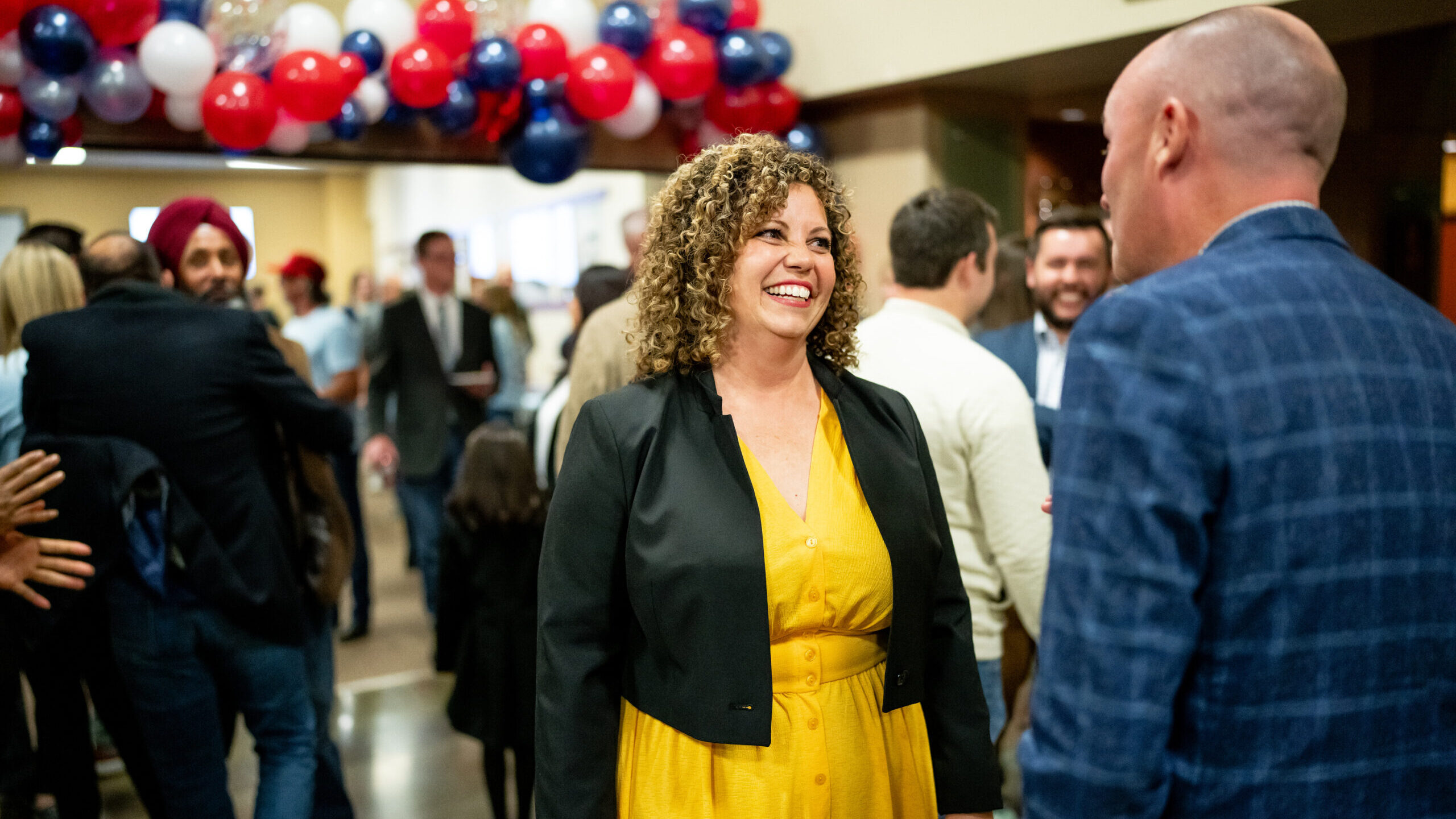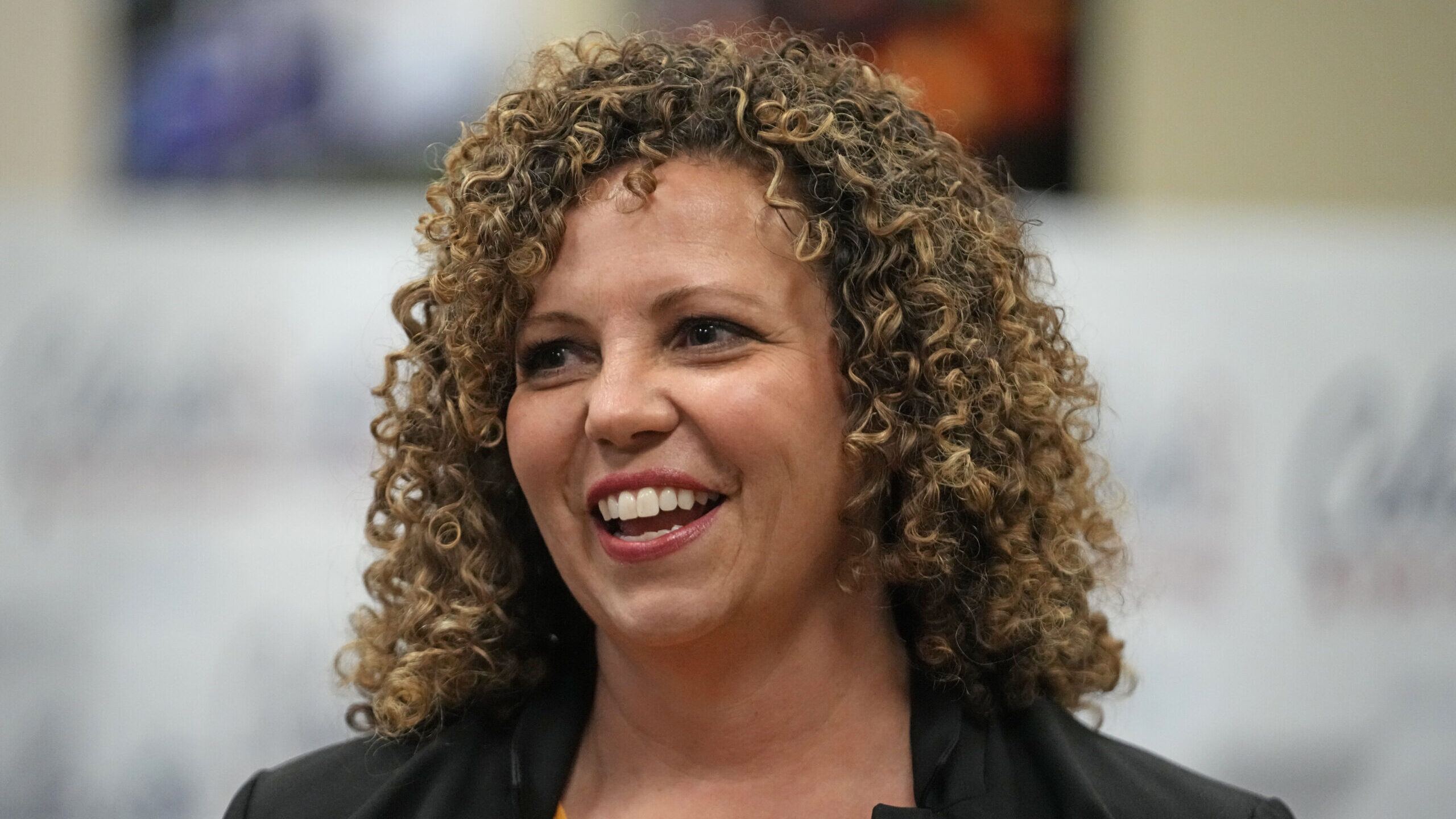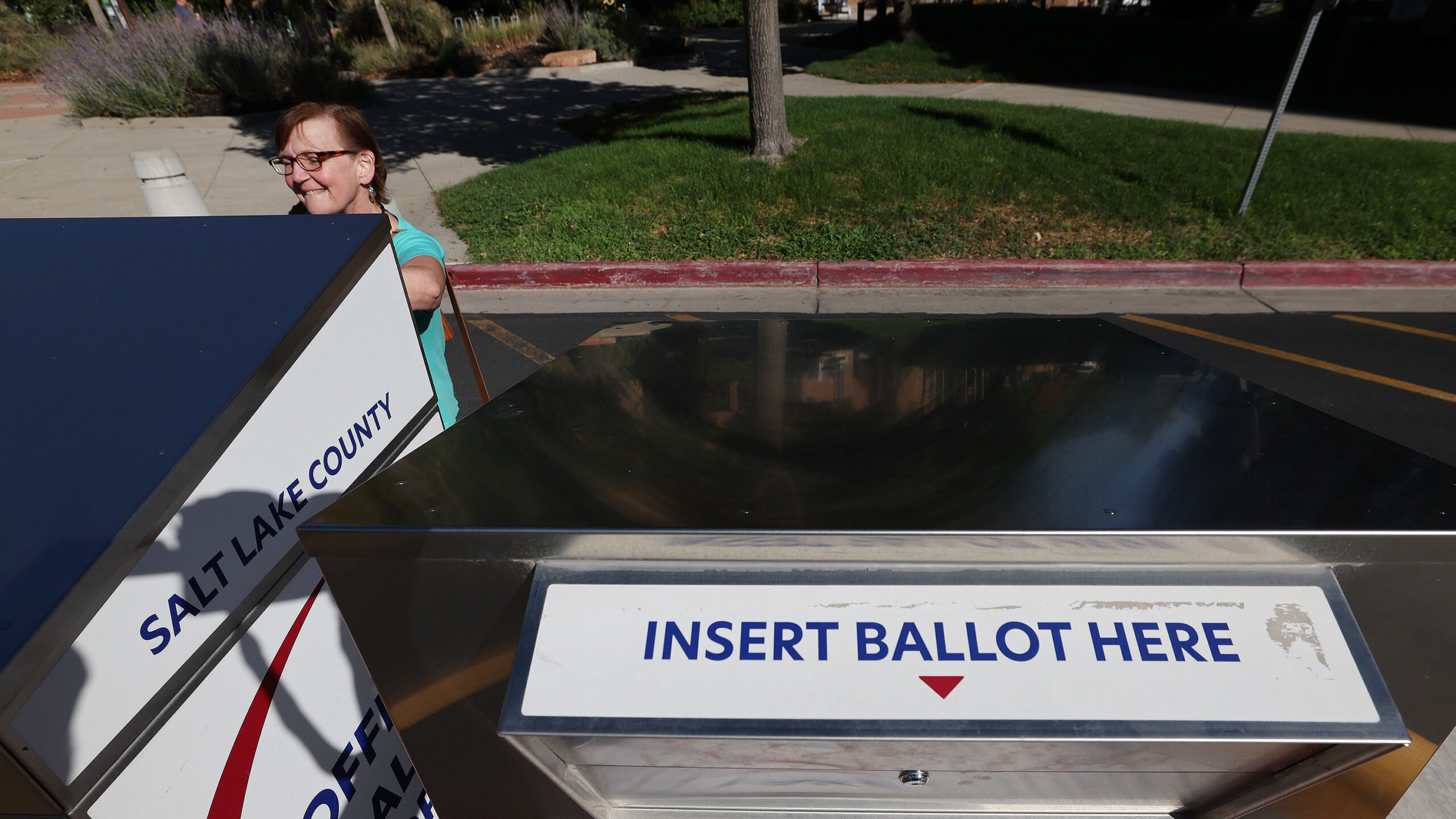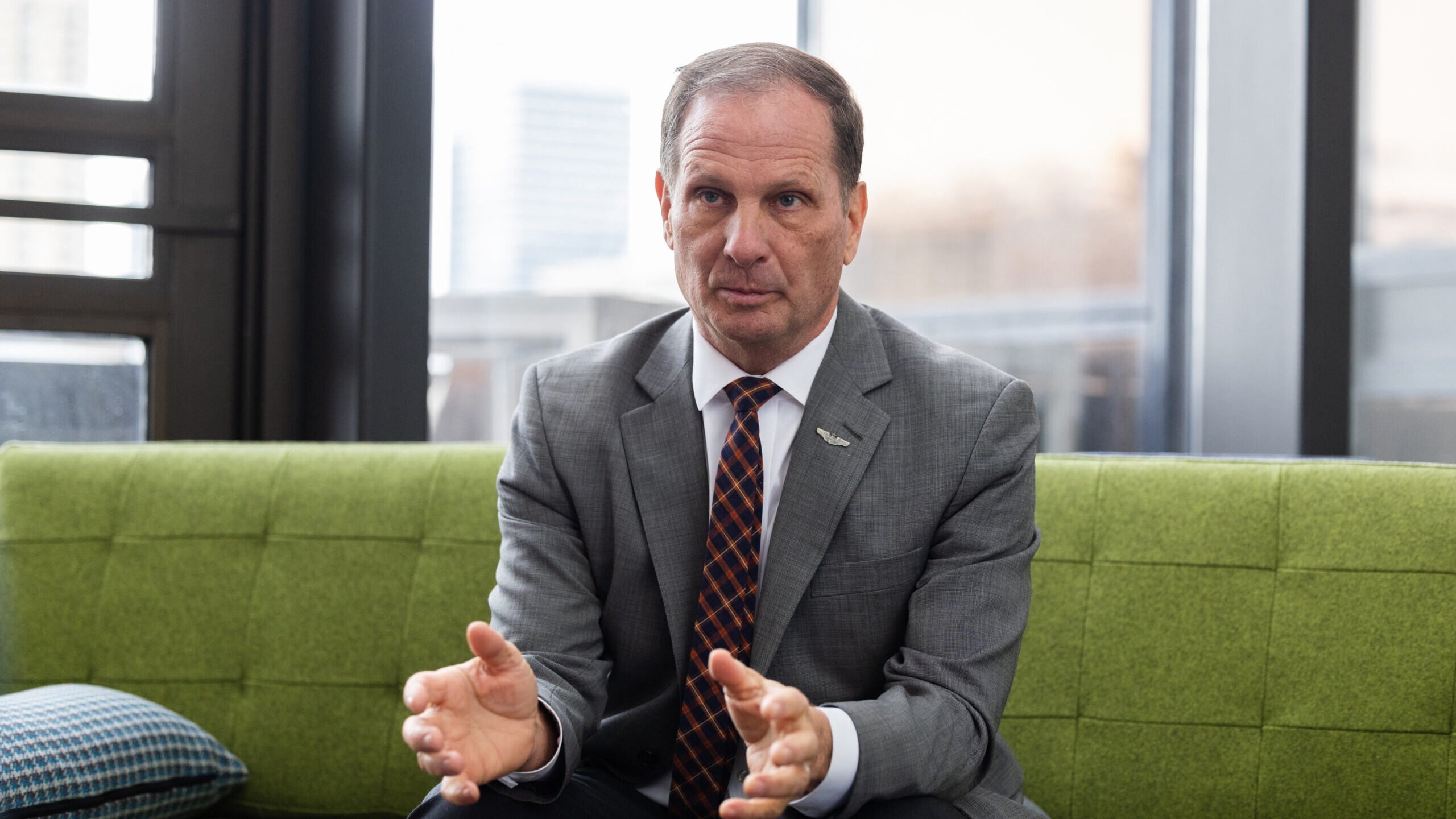2nd Congressional District candidate Joseph Buchman in 8 questions
Aug 25, 2023, 5:00 AM
SALT LAKE COUNTY, Utah — Joseph Buchman isn’t new to running for office in Utah. He’s been a candidate in at least four other races in Utah since 2008. Now, he’s running in the race to replace Rep. Chris Stewart, R-Utah.
KSL NewsRadio caught up with Buchman to ask the eight burning questions asked of all the candidates on the ballot. A transcript of their full interview follows.
Joseph Buchman’s stance on military
Kira Hoffelmeyer: Joe, Rep. Chris Stewart, obviously is vacating his seat. And he’s leaving as one of the only military veterans that represents Utah. So what do you think are the interests of Utah’s military bases that need the most protection?
Joseph Buchman: Well, so the United States government has $32 trillion in debt, we have another $158 trillion in mandated by federal law, future, unfunded spending currently. That’s a debt of almost a million dollars per taxpayer in the United States right now.
So I’m not about defending any military bases, anywhere that somehow don’t significantly advance or isn’t critical for actual national security.
Military bases should not be used as job programs. And I know that’s a controversial thing to say here in Utah where Hill has been on the list of bases that might be cut.
But I think it’s time for all of us to unite as taxpayers across the country and realize that our debt is indeed an existential threat. That advancing funding for military bases that aren’t needed for critical national security needs is not in our national security interest. That actually harms us, so much so that the rating organizations now are downgrading U.S. debt from AAA to AA-plus.
This increases the interest burden on all of us. I think our economy, as by the way, Mike Lee’s Chief of Staff and I shared this conversation in 2017, almost eight years ago, but the greater existential threat to the United States is not a foreign adversary right now — it’s our own out-of-control spending.
So I would say we keep the bases in Utah only if they’re needed for critical national security needs, and everything else should indeed be cut.
Joseph Buchman’s stance on public lands
Kira Hoffelmeyer: Utah is around 60% to 70% run by the Feds when it comes to public lands. And the 2nd Congressional District, like most of the congressional districts in Utah, have public lands in them. So how would you work with the feds to properly manage public lands for the state of Utah?
Joseph Buchman: I think the United States government changed dramatically, obviously, with the Louisiana Purchase in the westward expansion.
There are no public lands in the states back East — east of the Mississippi there’s not even a Bureau of Land Management. If they have a single acre, I’m not sure where it is.
But as we expanded west, something changed in our national culture and consciousness about what a state was. And so I would very strongly advocate that the federal government needs to re-establish something like the Homestead Act and start selling off a lot of its unnecessary federal lands so that they can be developed by private interests.
And a lot of that then could be used to pay down this massive federal debt that we’re paying interest on. I think that would be in all of our interests.
Secondly, I think the Native American lands in Utah are an exception to that. I would be very much in favor of self-autonomy, self-rule for cultures — not only here in Utah, but around the world — for example, Kurdistan, in Turkey and northern Iraq. Those are people who have an identifiable culture that deserve their own nation. The Persians as well, this is consistent with the United Nations resolutions.
And so here in the United States, I think we ought to have more respect for self-government, on our native lands. But in terms of federal lands, that aren’t necessary, again, for what? National security and what else? I’m not sure what else. National parks? Certainly. Utah has some of the best in the world.
But for the rest of it, let’s start selling it off. There’s no reason for the Bureau of Land Management to just hold on to lands that aren’t eventually going to wind up in a national park or in a Native reservation or provide some public benefit. And I think that if we look back in history toward what we did with the Homestead Act, there’s a great model for that already.
Joseph Buchman and the shutdown showdown
Kira Hoffelmeyer: So you hinted at this a little bit when you were answering the first question. If elected, you will end up right on time for what we around here call a shutdown showdown. You know, all about the finance, all about all that stuff. So what do you have to say about the state of the economy, of inflation, of spending … all that jazz?
Joseph Buchman: So I earned an MBA in finance, and while I don’t think the public schools should require any particular courses … boy, I sure wish Americans had some sort of basic education in macroeconomics.
Inflation is simply printing more money than there are goods and services available to be purchased by that.
And what we’ve seen as an absurd level of federal monetization of the debt.
No nation in history has ever spent itself to wealth. No nation in history has ever been able to spend itself to more health care, more education, more housing — whatever for people by simply printing money.
Now what we need to encourage is America’s actual productive activity, and that’s entrepreneurship and small business, and rewarding people who are actually productive.
Today, there’s increasingly an outrageous excessive burden on productivity. Your reward for actually being productive is to be taxed at a higher rate.
And we’ve got to manage that in a way that the incentives for actually starting a small business, creating employment for others, developing products and services that are of benefit to people that have more value to them than dollars that are willing to trade for those.
That’s what will grow an economy that will give us a standard of living, and prosperity, and liberty and flourishing for all, such that we can have high-quality health care and high-quality education.
We don’t get that when you have a government that simply prints the money to try to make it happen. That promises things it can’t manage to deliver.
There’s no way we’re actually going to tax at a rate that will fund the $150 [trillion] to $160 trillion mandated by federal law, future spending that’s currently unfunded.
It is a real crisis, and it is a showdown, and at some point, our members, our representatives in Congress have got to stop kicking the can down the road, and do what’s best for us economically in the long run. And that’s going to be moving toward a balanced federal budget as quickly as possible.
Joseph Buchman on where Congress + SCOTUS meet
Kira Hoffelmeyer: The Supreme Court has handed down a lot of decisions on some super divisive stuff in the last eight months. You know, abortion, affirmative action, all that stuff. What do you see is the role of a member of Congress in all of this?
Joseph Buchman: I think the court’s position was not unjustified. We’ll take Roe v. Wade as an example. What they basically said was, this is a legislative issue, this should have been decided legislatively. And we had a Supreme Court that the time of Roe v Wade, in effect, legislated some interpretations of the Constitution. That, quite frankly, I’m very sympathetic to.
A right to privacy is core to liberty. I have three daughters. If any of them got pregnant, whether by rape or not, I simply do not want the federal government knowing about that. Not early on, not acting to protect the life of the unborn from day one.
Can you imagine the tyranny that would have to exist in America to actually act on protecting the unborn in the first trimester?
So Roe v. Wade, the first-trimester issue of privacy, third trimester right of the unborn triumphs in, some respects, certainly, as you get toward the end of that third trimester. And in the middle, what they said was, “We’ll give the middle back to the states.”
Unfortunately, that never happened. We polarized the debate and became crazy.
So, what the courts basically said to Congress, the United States Congress, was, ‘Look, you’ve had 40 to 50 years to legislate on this issue … and you dropped the ball.’ Whether it was when the Democrats had the House, and the Presidency and the Senate … that legislation could have been passed to protect abortion.”
Well, when the Republicans had the House and Senate and the White House, they could have acted to make abortion illegal. They didn’t do it.
So frankly, the court’s saying to the legislative branch, you’re not doing your job.
I think that’s a similar argument I could go through them on the other issues if you want, but for time, I think the court is basically saying, ‘Let’s get back to the constitutional checks and balances. You want to legislate on something like abortion, you do it, and let’s let the court return to its constitutional role of interpreting the law and not trying to extend it beyond any reasonable interpretation.’
I don’t think they did that in Roe v. Wade, but I’m not unsympathetic to the argument that this invention of a right to privacy, which was not in the Bill of Rights, but wouldn’t have been better handled by the legislature.
It’s a complicated issue. Really … I need like a weekend.
Joseph Buchman on running for re-election
Kira Hoffelmeyer: If you’re elected, you’ll get into office and then basically have to file to run again. So how do you feel about that?
Joseph Buchman: I think it’s absurd.
I also ran in the special election where Jason Chaffetz resigned. And Chris Stewart came out of the Republican Convention, John Curtis was forced to primary … John Curtis wound up winning.
We were in seven debates back then, and I absolutely loved it. It was an incredible experience. And here I am doing it again.
So why? I think I changed the nature of the conversation by being in those debates. I think I brought a reasonableness that tended to depolarize the Democrat and the Republican running in that race.
Dr. Kathie Allen was the Democrat, Jim Bennett was there as the son of former Sen. Bob Bennett running with United Utah, and there were other candidates as well. But I’m running to get into the debate for opportunities like this, for which I’m very grateful to KSL for inviting me. Because I think I can bring something to the table that changes the nature of the conversation.
Certainly, Congressman Curtis has been in my home a couple of times since then, among other things, acting as a representative of the Library of Congress. I arranged for the donation of political materials from the Libertarian Party. That’s A.
B — I think it’s absurd. Here we are in Utah, electing someone to serve maybe nine months, and all they’re going to do is raise money to run for re-election. I wouldn’t do that.
I’m not sure I’d even run for re-election because I think the chances of being re-elected as a nonpartisan, unaffiliated guy … Do you want to see the Republicans and Democrats unite on something? Elect an unaffiliated, nonpartisan guy to the United States House. They’ll be sure that the cost of getting re-elected will be $20 [million], $30 [million], or $40 million.
So I’ll say right now, if I’m elected by some miracle, I will not run for re-election.
I’ll be out there to change the nature of the debate to get in the middle of this debt showdown and bring some sanity to it, which I think I could do and not just waste my time, as I think whoever’s elected will probably do. Maybe the media in their role as the fourth estate of government, can hold that accountable.
If we elect someone in the United States House, who from January to November only runs for re-election, you ought to blow a whistle on it.
I’m hoping whoever does get elected actually gets there and serves in some meaningful and lasting way.
And I promise you, if I am elected, I’ll show up pretty much as I am on this interview and see what I can do to get people to tone down the polarization and actually get serious about the economic crisis we are truly facing.
We talked about the greatest generation, which was my dad who fought in World War II, my grandfather in World War I. I fear that my grandchildren are gonna look at my generation as the one that figured out a way to steal from them through time, and I’d like us to stop that as quickly as possible.
Joseph Buchman on some silly questions
Kira Hoffelmeyer: Okay, super simple BYU or Utah.
Joseph Buchman: Oh, I’m an Indiana University fan. I’m sorry. That’s where I grew up. Bob Knight, the Hoosiers, basketball only.
I was at one BYU game and I had a lovely time. I sat near the visitor section, I got free ice cream, and I think that’s amazing.
Hoffelmeyer: All right, Joe. So human or sun bear?
Buchman: It’s a sun bear, but I wouldn’t be surprised if it was a human in a bear costume. Because in 2008, I was in Beijing, outside of the Bird’s Nest for the opening of the Beijing Olympics. They ended that opening ceremony with fireworks.
So I’m in a hotel, I’m watching the fireworks that are going off [on TV] and I run out of the hotel across from the Bird’s Nest … There’s nothing in the sky.
I run back into the hotel, there are fireworks on the TV.
I run back outside, there’s nothing at the Bird’s Nest. Just this incredible layer of clouds and smog.
What I learned was the Chinese government digitally enhanced the broadcast of the opening ceremonies of the 2008 Olympics with digital fireworks.
So I wouldn’t be surprised if it’s a human and a costume and not a sun bear.
Hoffelmeyer: If the FBI were to do a background check or a security clearance check on you — for whatever reason— what would be a silly thing that they would find that you would be … that you would find silly to have to address?
Buchman: I’ve been the master of ceremonies for the Roswell UFO Festival on five occasions over the years.
I also served as a moderator for, and then later filled in for, a member of the United States House who left early in 2013’s citizens hearing on UFOs — where we had 43 witnesses from 10 nations, five former members, the United States House retired, and Sen. Mike Gravel. And we created a faux congressional hearing that I served on, I filled in for Darlene Hooley on Friday afternoon when she left early because her sister had died that week.
Anyway, I imagine the FBI — I know, actually, that the FBI is quite actively investigating the whistleblowers who have recently come forward. Military officials, Navy pilots, and others to testify under oath before Congress.
I wonder what they think of all I’ve been doing on UFOs.
Back in 2008, when I also ran in the 1st District, and was living in Park City at the time, The Park Record ran a front-page article on me titled, “Immigration, taxes, and little green men”.
Back then, I was calling for the elimination of nondisclosure agreements on waste, fraud, criminal activity and the extraterrestrial issue. And I’ll tell you candidly, I’ve had two close friendships, one with a friend of mine who served as chief of medical operations at NASA. I’ve known him since we were Eagle Scouts at about the same time. And the other, who has now passed away, was the chief briefing officer for the Chairman of the Joint Chiefs of Staff.
Each of these people told me that I had nondisclosure agreements and could not talk to me about extraterrestrials or UFOs. Or they would go to a place worse than Leavenworth, and their wife would lose the health care and the pension.
So I ran for Congress, in part, to get my friends freed from those NDAs so they can talk openly.
Last December, President Biden, to his credit, signed the legislation eliminating NDAs so these individuals can come forward before Congress to testify. That’s happening. We had a hearing in the House last week. Sen. Warner’s probably going to have one in the Senate this fall.
We’re on the verge, I think, of finding out we’re not alone in the cosmos. And I don’t think the FBI and others in their background checks are yet fully entirely comfortable with people who are saying those kinds of things.
This is part of a collection of questions asked to all candidates running in the 2nd Congressional District special election before the Sept. 5, 2023, primary election. See below for the interviews of the other candidates.













